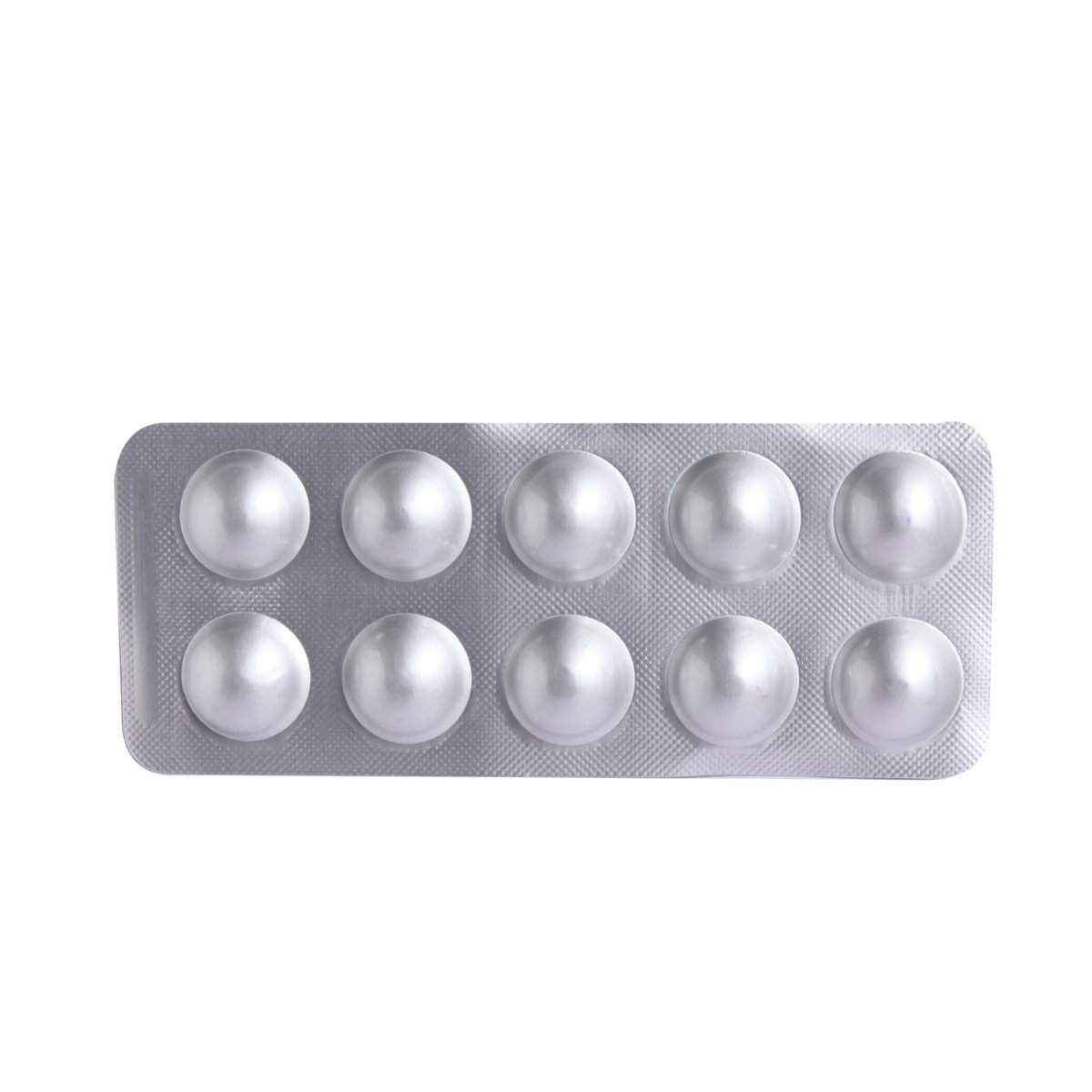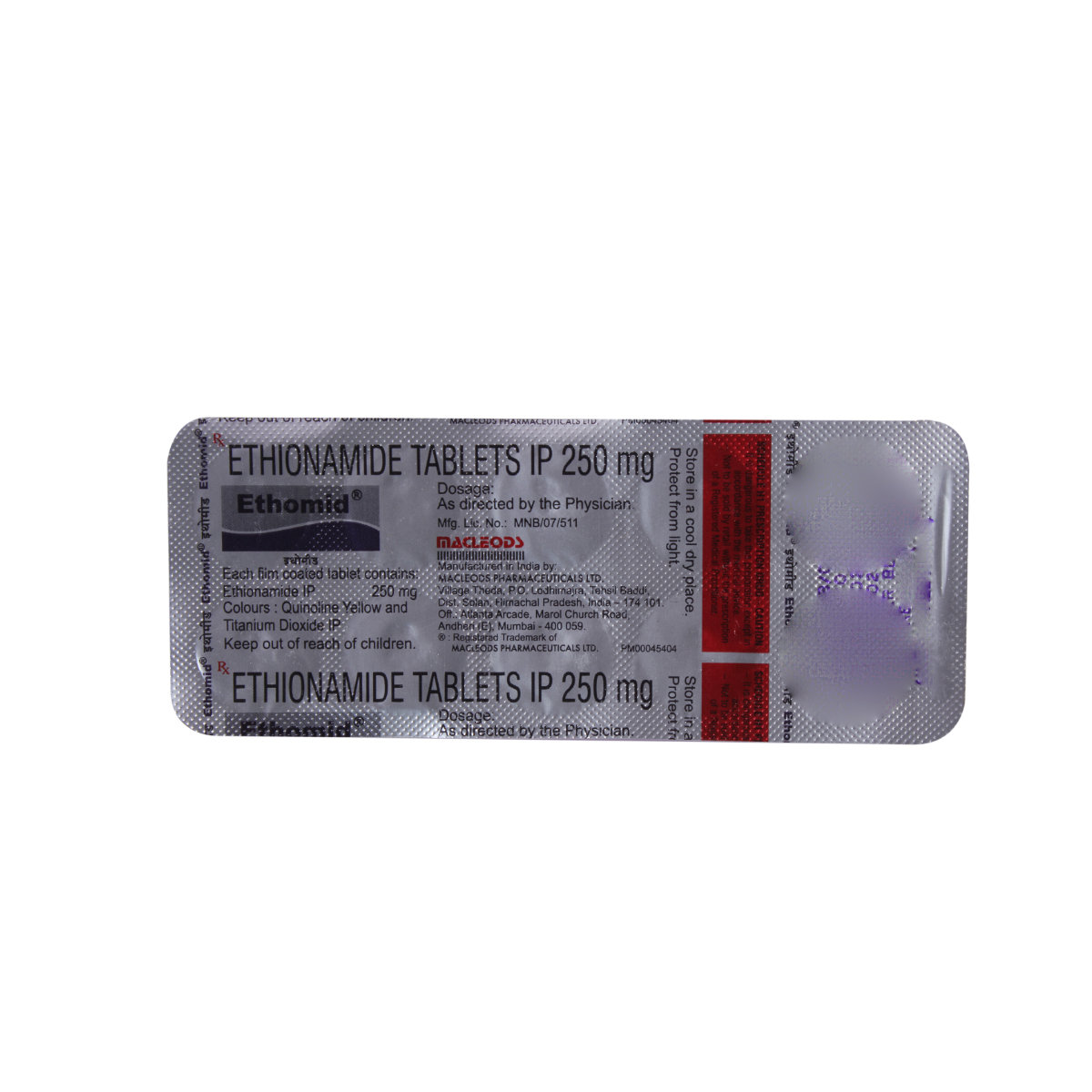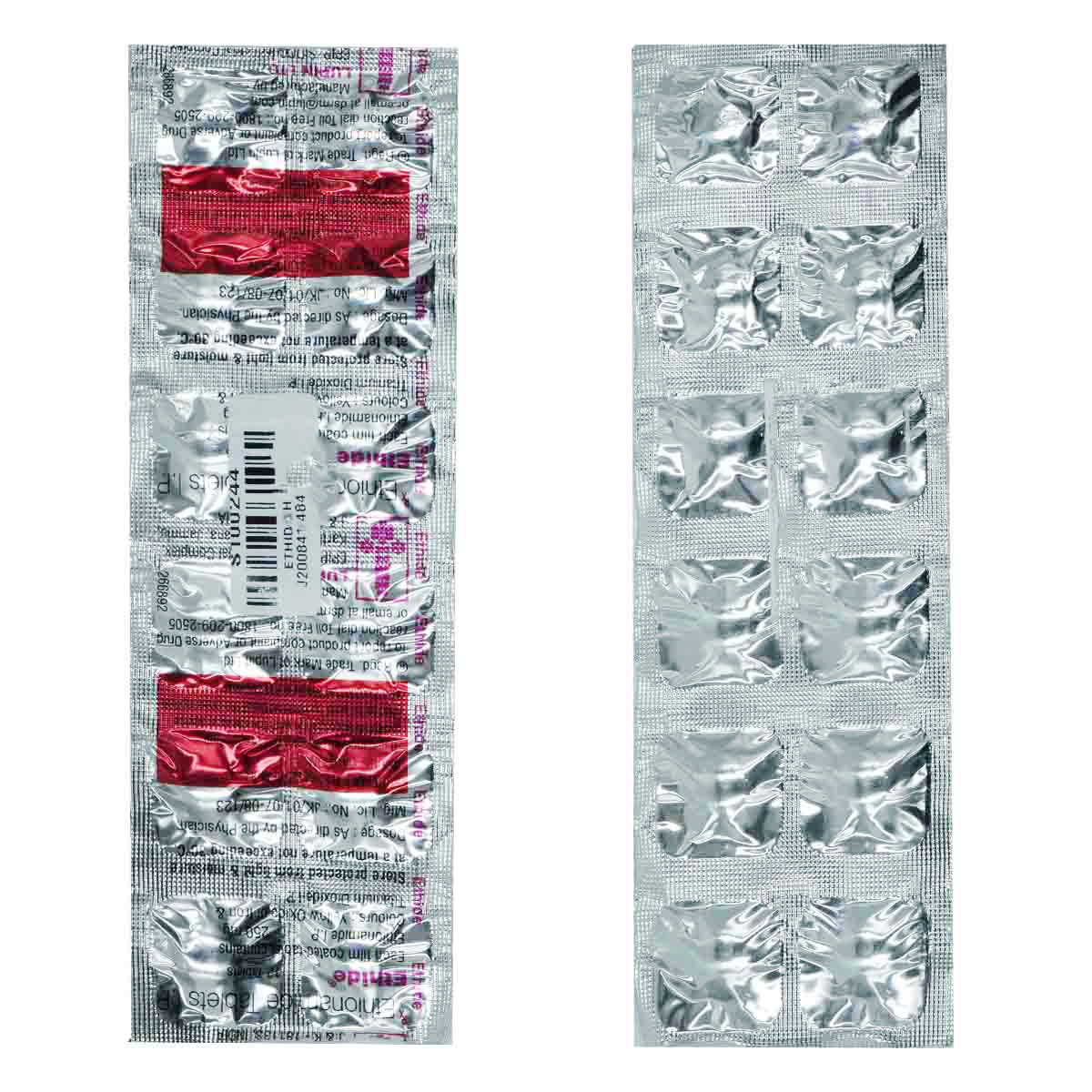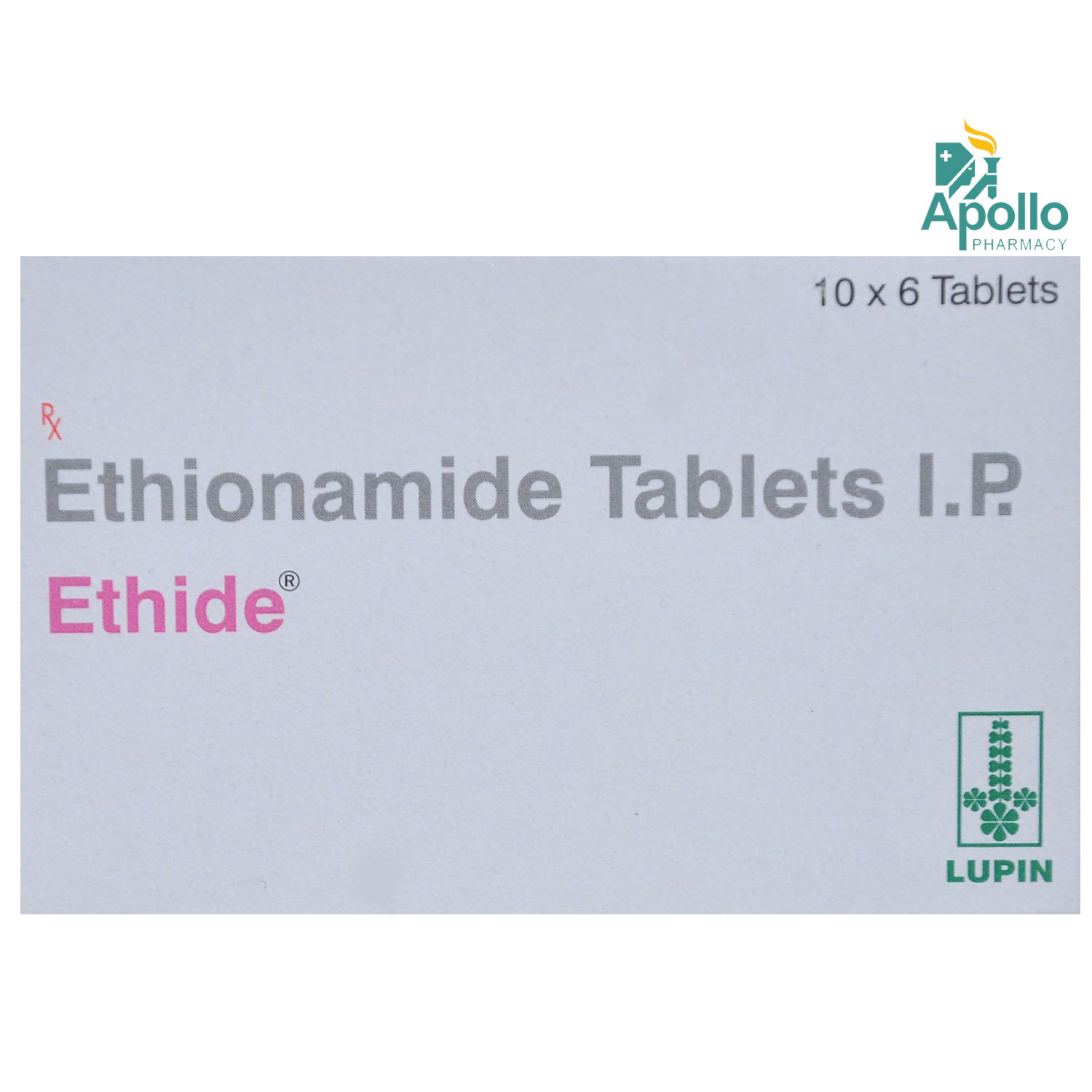Ethomid 250 mg Tablet 10's
MRP ₹155
(Inclusive of all Taxes)
₹23.3 Cashback (15%)
Provide Delivery Location
Online payment accepted
 Prescription drug
Prescription drugWhats That
Composition :
Manufacturer/Marketer :
Consume Type :
Expires on or after :
Return Policy :
NPPA :
About Ethomid 250 mg Tablet
Ethomid 250 mg Tablet belongs to the group of medicines called antibiotic drugs primarily used to treat tuberculosis. Tuberculosis is an infectious disease that mainly affects the lungs. Ethomid 250 mg Tablet should not be used alone and must be given in combination with other tuberculosis medications. Ethomid 250 mg Tablet does not work against infections caused by the virus, including cold and flu.
Ethomid 250 mg Tablet consists of a medicine called 'Ethionamide' that works by inhibiting bacteria's growth that causes tuberculosis (Mycobacterium tuberculosis).
The dose and duration of Ethomid 250 mg Tablet can vary depending on your condition and the severity of the infection. In some cases, you may experience common side effects such as nausea, vomiting, abdominal pain, diarrhoea, increased saliva, strange metallic taste, or sores in the mouth. Most of these side effects do not require medical attention and will resolve gradually over time. However, you are advised to talk to your doctor if you experience these side effects persistently.
Do not stop taking Ethomid 250 mg Tablet despite symptomatic relief. Treat your condition effectually, and continue taking Ethomid 250 mg Tablet for as long as it has been prescribed. Take Ethomid 250 mg Tablet with caution if you have diabetes. Consult your doctor before taking Ethomid 250 mg Tablet if you are pregnant. Avoid breastfeeding while taking Ethomid 250 mg Tablet as it passes into breast milk. Ethomid 250 mg Tablet may rarely cause dizziness, and vision problems, so drive with caution if you experience these signs. Avoid consuming alcohol with Ethomid 250 mg Tablet as it might lead to liver problems or mental/mood changes. Do not take Ethomid 250 mg Tablet if you have severe liver disease. Inform your doctor immediately if you experience/notice confusion, seizure, dark urine, or clay-coloured stools after taking Ethomid 250 mg Tablet .
Uses of Ethomid 250 mg Tablet
Directions for Use
Key Benefits
Ethomid 250 mg Tablet contains ‘Ethionamide’ that works by inactivating a bacterial genetic material that allows TB bacteria (Mycobacterium tuberculosis) to make a copy of its protein for further growth inside the host cell (human). Ethionamide is indicated in treating active tuberculosis in patients with Mycobacterium tuberculosis infection resistant to rifampin or isoniazid.
Storage
- Drink water or other clear fluids.
- To prevent worsening of pain, limit intake of tea, coffee, or alcohol.
- Include bland foods like rice, toast, crackers, and rice in your diet.
- Avoid lying down immediately after eating as it may cause indigestion or heartburn.
- Avoid acidic and spicy food as it may cause indigestion.
- Inform Your Doctor: Notify your doctor immediately about your diarrhoea symptoms. This allows them to adjust your medication or provide guidance on managing side effects.
- Stay Hydrated: Drink plenty of fluids to replace lost water and electrolytes. Choose water, clear broth, and electrolyte-rich drinks. Avoid carbonated or caffeinated beverages to effectively rehydrate your body.
- Follow a Bland Diet: Eat easy-to-digest foods to help firm up your stool and settle your stomach. Try incorporating bananas, rice, applesauce, toast, plain crackers, and boiled vegetables into your diet.
- Avoid Trigger Foods: Steer clear of foods that can worsen diarrhoea, such as spicy, fatty, or greasy foods, high-fibre foods, and dairy products (especially if you're lactose intolerant).
- Practice Good Hygiene: Maintain good hygiene to prevent the spread of infection. To stay healthy, wash your hands frequently, clean and disinfect surfaces regularly, and avoid exchanging personal belongings with others.
- Take Anti-Diarrheal Medications: If your doctor advises, anti-diarrheal medications such as loperamide might help manage diarrhoea symptoms. Always follow your doctor's directions.
- Keep track of your diarrhoea symptoms. If they don't get better or worse or are accompanied by severe stomach pain, blood, or dehydration signs (like extreme thirst or dark urine), seek medical help.
- Regularly brush your tongue and teeth to prevent Excessive Saliva Production.
- Avoid eating foods high in sugar or acid since these foods might increase saliva production, which increases the Excessive Saliva Production.
- Keep your head up straight and maintain proper posture to prevent saliva from collecting in your mouth.
- Inform your doctor about the nausea and discuss possible alternatives to the medication or adjustments to the dosage.
- Divide your daily food intake into smaller, more frequent meals to reduce nausea.
- Opt for bland, easily digestible foods like crackers, toast, plain rice, bananas, and applesauce.
- Avoid certain foods that can trigger nausea, such as fatty, greasy, spicy, and smelly foods.
- Drink plenty of fluids, such as water, clear broth, or electrolyte-rich beverages like coconut water or sports drinks.
- Use ginger (tea, ale, or candies) to help relieve nausea.
- Get adequate rest and also avoid strenuous activities that can worsen nausea.
- Talk to your doctor about taking anti-nausea medication if your nausea is severe.
- Record when your nausea occurs, what triggers it, and what provides relief to help you identify patterns and manage your symptoms more effectively.
- Preventing Vomiting (Before it Happens)
- Take medication exactly as prescribed by your doctor. This can help minimize side effects, including vomiting.
- Having a small meal before taking your medication can help reduce nausea and vomiting.
- Talk to your doctor about taking anti-nausea medication along with your prescribed medication.
- Managing Vomiting (If it Happens)
- Try taking ginger in the form of tea, ale, or candy to help alleviate nausea and vomiting.
- What to Do if Vomiting Persists
- Consult your doctor if vomiting continues or worsens, consult the doctor for guidance on adjusting your medication or additional treatment.
- Weight loss without physical activity needs immediate medical attention.
- Get a physical examination and blood tests done to identify factors causing weight loss that could be related to metabolism and thyroid function.
- Avoid smoking and alcohol intake as it can alter your liver condition and increase your weight loss.
- Practice meditation and yoga to avoid anxiety, which can be one of the leading causes of weight loss.
- Talk to your dietician and consume food which can maintain ideal weight.
Drug Warnings
Before starting Ethomid 250 mg Tablet , please inform your doctor if you have a medical history, especially of: liver disease, underactive thyroid (hypothyroidism), kidney disease, or eye problems (such as optic neuritis and cataracts). Take Ethomid 250 mg Tablet with caution if you have diabetes. Ethomid 250 mg Tablet may lower your blood sugar levels. Also, check your blood sugar level regularly as directed by your doctor. Consult your doctor before taking Ethomid 250 mg Tablet if you are pregnant. This medication is not recommended for use in pregnant women. Avoid breastfeeding while taking Ethomid 250 mg Tablet as it passes into breast milk. Ethomid 250 mg Tablet may cause dizziness, and vision problems, so drive with caution. Avoid consuming alcohol with Ethomid 250 mg Tablet as it might lead to liver problems or mental/mood changes.
Drug-Drug Interactions
Drug-Drug Interactions
Login/Sign Up
Coadministration of lomitapide with Ethomid 250 mg Tablet can increase the risk of liver problems.
How to manage the interaction:
There may be a possibility of interaction between Ethomid 250 mg Tablet and Lomitapide, but it can be taken if prescribed by a doctor. However, consult a doctor if you experience fever, chills, joint pain, swelling, skin rash, itching, bleeding, tiredness, stomach ache, dark urine. Do not stop using any medications without a doctor's advice.
Coadministration of leflunomide with leflunomide can increase the risk of liver problems.
How to manage the interaction:
Although taking Ethomid 250 mg Tablet with Leflunomide can result in an interaction, they can be taken together if prescribed by your doctor. However, consult a doctor immediately if you experience fever, joint pain or swelling, skin rash, vomiting, abdominal pain, dark urine, or yellowing of the skin or eyes. Do not discontinue using any medications without consulting a doctor.
Excessive alcohol use while taking Ethomid 250 mg Tablet can increase the risk of side effects.
How to manage the interaction:
Although taking Ethomid 250 mg Tablet and Ethanol together can possibly result in an interaction, they can be taken together if prescribed by your doctor. However, contact your doctor immediately if you experience hallucinations(seeing & hearing things that do not exist) and abnormal thinking. Do not stop using any medications without consulting your doctor.
Coadministration of Ketoconazole and Ethomid 250 mg Tablet may increase the risk of liver damage.
How to manage the interaction:
Although taking Ethomid 250 mg Tablet with Ketoconazole can result in an interaction, they can be taken together if prescribed by a doctor. However, consult a doctor immediately if you experience fever, joint pain or swelling, skin rash, vomiting, abdominal pain, dark urine, or yellowing of the skin or eyes. Do not discontinue using any medications without consulting a doctor.
Taking rifampicin with Ethomid 250 mg Tablet can increase the risk of liver problems.
How to manage the interaction:
Although there is an interaction between Ethomid 250 mg Tablet and Rifampicin, they can be taken together if prescribed by a doctor. However, consult a doctor immediately if you experience fever, joint pain, skin rash, vomiting, abdominal pain, dark urine, or yellowing of the skin or eyes. Do not discontinue using any medications without consulting a doctor.
Taking Teriflunomide with Ethomid 250 mg Tablet can increase the risk of liver problems.
How to manage the interaction:
Taking Ethomid 250 mg Tablet with Teriflunomide together can result in an interaction, but it can be taken if your doctor has advised it. If you have any symptoms - fever, joint pain, swelling, skin rash, vomiting, abdominal pain, dark-coloured urine - immediately contact your doctor. Do not stop using any medications without talking to your doctor.
Taking mipomersen with Ethomid 250 mg Tablet can increase the risk of liver problems.
How to manage the interaction:
There may be a possibility of interaction between Ethomid 250 mg Tablet and Mipomersen, but it can be taken if prescribed by a doctor. However, contact a doctor if you experience fever, joint pain, swelling, skin rash, vomiting, abdominal pain, or dark urine. Do not stop using any medications without talking to your doctor.
Drug-Food Interactions
Drug-Food Interactions
Login/Sign Up
Diet & Lifestyle Advise
- Pineapple juice might help soothe the symptoms of cough and cold. It also has anti-inflammatory and mucolytic properties.
- Foods rich in vitamin C, such as kiwi, broccoli, and bell pepper, help improve the immune system.
- Avoid processed and fried foods.
- Warm ginger tea or warm soup can help relieve a cough.
- Avoid foods and drinks containing histamine or tyramine, such as cured meat, matured cheese, soya, tuna, salmon, mackerel, wine, and beer.
- To help prevent certain side effects (such as nerve problems) from this medication, your doctor may advise you to take vitamin B6 (pyridoxine).
- Quit smoking and avoid alcohol consumption.
Side Effects of Ethomid 250 mg Tablet
- Nausea
- Vomiting
- Diarrhoea
- Stomach pain
- Increased salivation
- Metallic taste in your mouth
- Headache
- Dizziness
- Drowsiness
Habit Forming
Therapeutic Class
All Substitutes & Brand Comparisons
RX
Not for online saleEthide 250 Tablet 12's
Lupin Ltd
₹186.5
(₹13.99 per unit)
RX
Not for online saleEthide 250 mg Tablet 6's
Lupin Ltd
₹186.5
(₹27.98 per unit)
100% COSTLIER
Drug-Diseases Interactions
Drug-Diseases Interactions
Login/Sign Up
FAQs
Ethomid 250 mg Tablet is an antibiotic which works by inhibiting the synthesis of mycolic acid (a saturated fatty acid found in the bacterial cell wall), thereby stopping the synthesis of the bacterial cell wall. Eventually, this leads to bacterial cell wall disruption. Ethionamide may have bacteriostatic or bactericidal in action. Ethionamide indicated in the treatment of active tuberculosis in patients with Mycobacterium tuberculosis infection resistant to rifampin or isoniazid.
Do not stop taking Ethomid 250 mg Tablet despite symptomatic relief. Treat your condition effectually, continue taking Ethomid 250 mg Tablet for as long as it has been prescribed for you.
Ethomid 250 mg Tablet might decrease the effectiveness of oral contraceptives (birth control pills). This could lead to an unplanned pregnancy. Instead, use a reliable barrier method of contraception such as condoms or the coil while taking Ethomid 250 mg Tablet . Consult your doctor if you have any concerns regarding this; your doctor may suggest an alternate contraception method.
Ethomid 250 mg Tablet might affect vision rarely. It may cause blurred/decreased/double vision, colour blindness, or eye pain. Inform your doctor right away if you notice/experience any of these serious side effects. Do not drive if you experience any of these symptoms.
Ethionamide might interfere with live bacterial vaccines and cause them not to work as well. Do not have any immunizations/vaccinations while on this medication.
Drug-Drug Interactions Checker List
- CYCLOSERINE
- ETHAMBUTOL
- ISONIAZID
- OMEPRAZOLE
- RIFABUTIN
- AMINOSALICYLATE SODIUM
- BACILLUS CALMETTE-GUERIN(BCG) VACCINE
Special Advise
- Your doctor may advise you to get regular liver tests while taking Ethomid 250 mg Tablet to check how your liver functions.
- You may need frequent blood tests to check your liver and thyroid function. You may also need frequent eye exams.
- If you have diabetes, check your blood sugar levels carefully while on this medication.
Disease/Condition Glossary
Tuberculosis (TB): Tuberculosis is an infectious disease that affects the lungs, but it can also spread to other body parts such as the kidneys, brain, spine, and bone marrow. Tuberculosis is caused by a bacteria named Mycobacterium tuberculosis. It is a contagious disease which can spread to others through small droplets released into the air by a person suffering from tuberculosis. Symptoms include a cough that lasts for a few weeks, pain while coughing or with normal breathing, unexplained fatigue, fever, night sweats, loss of appetite and weight. People who smoke or consume alcohol, people diagnosed with HIV, and immune system problems are more likely at risk of developing active TB.

Have a query?
Alcohol
Safe if prescribed
Avoid alcohol consumption while taking Ethomid 250 mg Tablet as it could lead to increased dizziness or mental/mood changes.
Pregnancy
Consult your doctor
Pregnancy Category C: There are no adequate and well-controlled studies in pregnant women. It is unknown whether Ethomid 250 mg Tablet can cause fetal harm when administered to a pregnant woman. It should not be used in pregnant women.
Breast Feeding
Consult your doctor
Ethomid 250 mg Tablet may pass into breast milk. Do not breastfeed while taking Ethomid 250 mg Tablet .
Driving
Safe if prescribed
Ethomid 250 mg Tablet may cause dizziness, vision problems, numbness and tingling sensation in hands and feet. Do not drive or operate machinery if you experience these symptoms.
Liver
Consult your doctor
Do not use ethionamide if you have severe liver disease. consult your doctor if you have any concerns.
Kidney
Consult your doctor
Dose adjustment may be needed. Please consult your doctor if you have any concerns regarding this or kidney impairment/kidney disease before taking Ethomid 250 mg Tablet .
Children
Safe if prescribed
Ethomid 250 mg Tablet should not be used in children without a doctor's advice.











